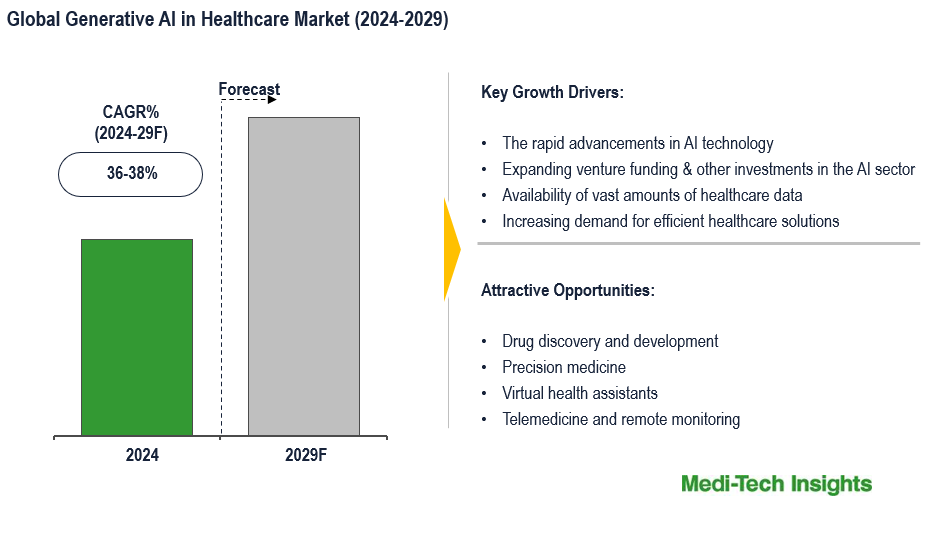Availability of vast amounts of healthcare data, including EHRs, medical imaging, and genomic data; growing applications in drug discovery; and the ability of generative AI to automate tasks, reduce errors, optimize treatment, and lower costs are some of the key factors driving the growth of the generative AI in healthcare market. Other factors driving the market growth are the rapid advancements in AI technology and the growing demand for efficient healthcare solutions and precision medicine. The market’s expansion is anticipated to be hampered, meanwhile, by issues with data privacy and security, legal obstacles, the high cost of developing, implementing, and maintaining generative AI systems, and ethical worries about using AI in healthcare.
Generative AI, in the context of healthcare, refers to artificial intelligence systems and algorithms that have the capability to generate new, original data, content, or information related to healthcare. These AI systems use deep learning and neural networks to create data or content that is not explicitly programmed but is instead generated based on patterns and information learned from existing healthcare datasets.
Free Sample of Our Research Report : https://meditechinsights.com/generative-ai-in-healthcare-market/request-sample/
The Rapid Advancements in AI Technology to Drive Market Growth
The rapid advancements in AI technology are pivotal in driving the growth of generative AI in the healthcare market. Breakthroughs in deep learning, natural language processing (NLP), and neural networks enable AI systems to analyse vast amounts of medical data with unprecedented accuracy. These technologies facilitate the automation of complex tasks such as drug discovery, diagnostic imaging, and personalized treatment planning, improving patient outcomes and operational efficiency. Enhanced AI algorithms can predict disease progression, optimize treatment plans, and even generate novel therapeutic solutions tailored to individual patients. As these technologies continue to evolve, they reduce the time and cost of medical research and development, making advanced healthcare solutions more accessible. Consequently, the integration of cutting-edge AI technologies is transforming healthcare delivery, driving demand for generative AI applications, and fuelling market expansion.
“Advancements in AI, particularly in machine learning and deep learning, have significantly improved the efficiency and innovation in industries like healthcare. These technologies enable faster data processing, more accurate predictions, and the automation of complex tasks, which are crucial for accelerating growth”- Vice President, GenAI Product and Data Strategy, An AI Healthcare Company, United States
Expanding Venture Funding and Other Investments in the AI sector to Fuel Market Growth
Venture capital investment in artificial intelligence (AI) has surged in recent years, reaching record levels in 2024, with the generative AI (GenAI) sector particularly benefiting. In 2023, GenAI start-ups globally raised USD10 billion in venture capital, marking a 110% increase from 2021 (source: GlobalData). The sector is projected to receive over USD12 billion globally in 2024 (source: EY). The healthcare industry is emerging as a key focus for generative AI applications, with venture capitalists increasingly recognizing its transformative potential. This has led to significant financial investments, not only from VCs but also from major corporations. For example, Microsoft has invested over USD13 billion in OpenAI since their partnership began in 2019, integrating OpenAI’s models across its product suite, including Azure, Bing, Teams, and Windows.
Technological Innovations are Driving the Generative AI in Healthcare Market
The Generative AI in Healthcare market is technology-driven and is marked by constant initiatives for product innovations. For instance,
- In June 2024, Cognizant, in partnership with Google Cloud, launched healthcare-specific generative AI solutions to streamline administrative processes and improve patient care experiences. These AI-driven tools target high-cost workflows, enhancing efficiency, accuracy, and overall healthcare delivery
- In April 2014, Augmedix launched Augmedix Go, the first fully-automated, generative AI-powered medical documentation product for emergency departments, following a successful pilot with HCA Healthcare. The solution aims to enhance patient care, reduce clinicians’ documentation burden, and improve productivity by accurately automating medical notes in complex, noisy ED environments
- In March 2024, NVIDIA launched over two dozen healthcare microservices, enabling global healthcare enterprises to leverage generative AI for advanced medical applications across any cloud platform. These microservices, including optimized AI models and development tools, accelerate healthcare workflows in drug discovery, medical imaging, and genomics, enhancing patient care and clinical interactions
- In February 2024, Hartford HealthCare launched its Center for Artificial Intelligence (AI) Innovation in Healthcare to advance AI research and development in clinical care, collaborating with institutions like MIT and the University of Oxford. The center aims to lead AI-driven healthcare transformation by focusing on collaboration, trustworthiness, and innovation, building on Hartford HealthCare’s existing AI initiatives
US Expected to be a Major Growth Engine in Generative AI in Healthcare Market
The US is expected to be a major growth engine in the Generative AI in healthcare market due to several factors. First, the country’s robust healthcare infrastructure and advanced technology adoption create an ideal environment for AI integration. Major healthcare providers, such as hospitals and clinics, are increasingly embracing AI to enhance patient care, streamline administrative processes, and improve outcomes. Second, the US is home to leading AI companies, research institutions, and tech giants like Google, IBM, and NVIDIA, which are heavily investing in AI development and applications tailored for healthcare. This fosters innovation and accelerates the deployment of AI solutions in the medical field. Third, there is significant venture capital funding and government support for AI in healthcare, further driving market growth. Regulatory bodies like the FDA are also adapting frameworks to ensure the safe integration of AI technologies, encouraging more widespread adoption. Overall, the US combines technological leadership, investment, and a supportive regulatory environment, making it a key driver in the global Generative AI healthcare market.
Organic and Inorganic Growth Strategies Adopted by Players to Establish Their Foothold in the Market
Players operating in this market are adopting both organic and inorganic growth strategies such as collaborations, acquisitions, and new product launches to garner market share. For instance,
- In July 2024, GE HealthCare and Amazon Web Services (AWS) formed a strategic partnership to develop generative AI applications aimed at enhancing medical diagnostics and patient care. GE HealthCare will use AWS’s cloud and AI services to create innovative solutions that improve clinical workflows, diagnostic accuracy, and patient outcomes, accelerating the development and implementation of new healthcare technologies
- In March 2024, Google Cloud integrated its Vertex AI Search with MedLM and Healthcare Data Engine (HDE) to enhance generative AI healthcare services, improving patient record summaries and access to longitudinal data. The updates include expanded HDE access, new MedLM features for chest x-ray classification, and a data mapping tool, aiming to advance AI-driven healthcare solutions while addressing potential issues with AI credibility
- In February 2024, CitiusTech launched, the CitiusTech Gen AI Quality & Trust solution, a pioneering solution to enhance the reliability, quality, and trust of generative AI in healthcare, addressing common concerns that delay AI adoption. The solution offers a comprehensive framework with metrics and methods tailored to healthcare, enabling organizations to confidently scale Gen AI applications
- In November 2023, Wipro partnered with NVIDIA to enhance healthcare solutions using generative AI, leveraging NVIDIA’s AI Enterprise software for improved member experience, enrolment, and claims processing. This collaboration aims to accelerate the adoption of AI in healthcare, enabling custom AI models and transforming digital and business processes in the industry
The generative AI in Healthcare market is expected to gain further momentum in the coming years due to technological advancements, rising R&D investments, new product launches, and aggressive organic and inorganic growth strategies followed by the players.
Competitive Landscape Analysis: Generative AI in Healthcare Market
The global generative AI in Healthcare market is marked by the presence of established market players such as Amazon Web Services, Cognizant, Google LLC, IBM Corporation, Meta, Microsoft Corporation, NVIDIA, OpenAI, Oracle Corporation, and Syntegra, among others.
Future Outlook of the Generative AI in Healthcare Market
The global generative AI in Healthcare market is expected to gain further momentum in the coming years due to its abilities to create synthetic datasets that for training machine learning models; enhance patient engagement; streamline processes and improve efficiency; and the growing trend of collaboration between AI developers and healthcare professionals. These factors collectively contribute to the growth and evolution of the generative AI in healthcare market.


